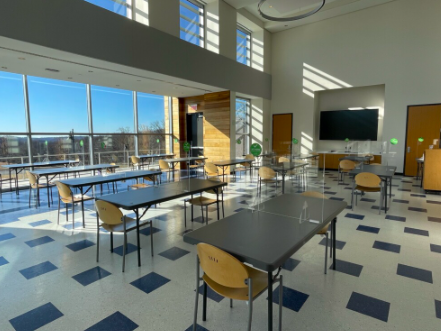Isabel Rozes ‘24
Screening, testing, and dining plans on EA’s campus have all strengthened in the new year, in response to holiday traveling and updating data from administrative consultation.
In an announcement on January 4, 2021, T.J. Locke, Greville Haslam Head of School, detailed updates relating to post-travel quarantine, the Pennsylvania travel advisory guidance, daily health screening questionnaire via the SafetyApp, community pledge, quarantine scenarios, and on-campus safety protocols, including masking and distancing. These precautions are now being implemented.
Director of Health Services and school nurse Laura Hurst, reports a rise in questions from the EA community related to travel, quarantine and whether one qualifies as a “close contact” and the consequences of that qualification. Hurst explained that EA requires its community members to follow Pennsylvania’s travel guidance. This requires travelers when they return to the state of Pennsylvania to provide proof of a negative COVID test result or to quarantine for ten days before returning to campus. The negative COVID-19 test must be from a specimen collected within 72 hours prior to returning to Pennsylvania. The Pennsylvania travel guidance provides that if actual test results are unknown upon the arrival in Pennsylvania, one should quarantine until their test results are obtained.

Questions on the SafetyApp daily health screening questionnaire are adjusted regularly as federal and state guidelines change and questions arise in the EA community related to travel and symptoms that may or may not be COVID-19 related. Hurst said she works through “each person’s individual circumstances to see if they qualify as a close contact.” Mark Notaro, the Director of Operations, adds that if a screening in the morning yields a red screen, “our team of screeners immediately reach out to the families to discuss which question led to the red screen notification and provide guidance on steps moving forward,” Notaro explains.
Surprisingly, since in-person instruction and voluntary winter athletic programming resumed for the Upper School students and staff on Monday, January 11, 2021, there has not been an increase in the on-campus testing by EA’s Health Services personnel. Hurst noted that perhaps there is more testing readily available in the community as compared to the fall of 2020, so that people are able to obtain testing easily. EA’s testing guidelines “COVID-19 Testing at EA” published on October 28, 2020 provide that if a student or employee are experiencing COVID-19 symptoms during the day at school or at home, they can contact EA’s Health Services office to schedule an on-site molecular (PCR) COVID-19 test. Unlike other local schools such as Shipley and Balwin, EA does not utilize random COVID-19 testing.
Hurst is uncertain when the teachers and staff of EA will start receiving the COVID-19 vaccinations as part of phase 1B under Pennsylvania’s phased vaccination plan. “We are monitoring each county’s vaccine availability and sharing it with people as we can. As of right now, we are not in 1B, it is hard to predict when it will be,” Hurst stated. She continues to watch all the surrounding counties because each county is slightly different and faculty are permitted to receive the vaccine in the county they live in or work in.
Another significant change the EA community has noticed on-campus is in the dining policies at EA. Notaro explained, “we elected to change the seating arrangement to two per table in the main dining hall as well as the remote dining hall in the Field House.” “This change was important to continue to ensure that everyone was separated by 6 feet, as per the CDC guidelines”, Notaro stressed. “Even though we had nearly 6 feet spacing with plexiglass dividers prior to the break, we elected to make the change to allow for maximum feasible spacing.”
Students are adjusting to changes from COVID-19 this academic year in 2021. For example, the Student Council has had to adjust to planning safe distancing events and restructuring the usual set-up. Eliza Aldridge ‘21, Student Council President and Senior Committee Member stated, “as we can’t plan large, in-person Upper School events like we could in previous years, COVID has forced Student Council to reorient our goals and expectations and for the remainder of the year, we have to instead brainstorm new ways to provide (mostly virtual or distanced) opportunities and support to the Upper School.”
Another example of change in academic curriculum is in the course of Honors Dance as the dancers are preparing for recorded video performances to replace the in-person spring show. Kaleigh Criville ‘24 states that “it takes a lot of work, preparation, and time to convey the passion and precision of a live performance through a video. However, we are all working diligently to create impactful videos.”
The Episcopal Academy’s COVID-19 task force continues to meet weekly to discuss ways to make currently acceptable activities safer, as well as ascertain how to safely allow other activities, according to Mark Notaro, the Episcopal Academy’s Director of Operations. Notaro added that the EA COVID-19 task force is exploring advancements in testing, and is “constantly evaluating the local, state and federal guidance.”